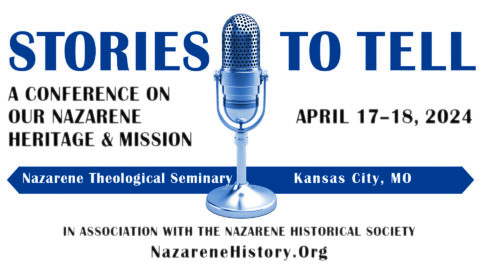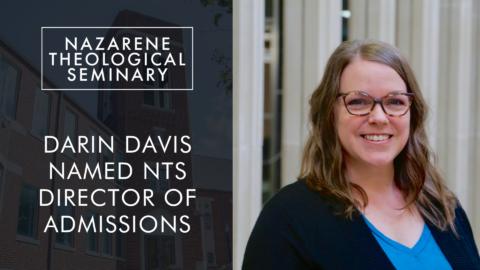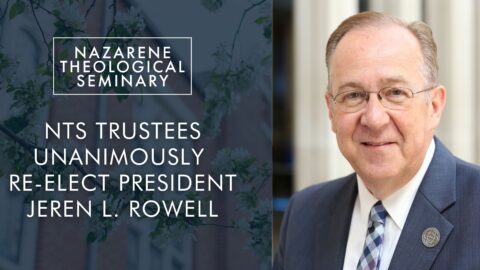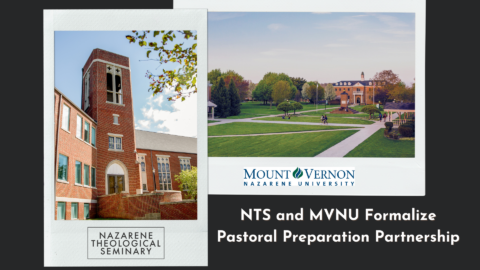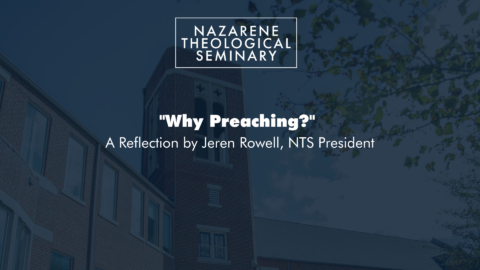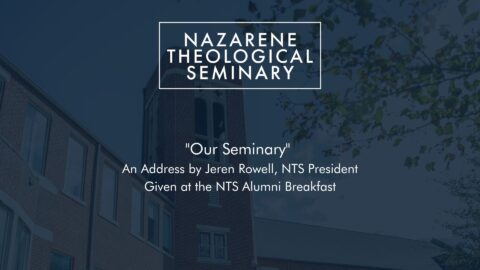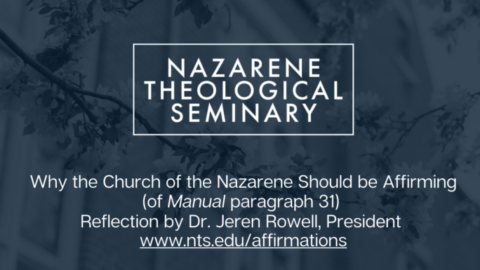March 30, 2020
During the season of “social distancing” due to the COVID-19 pandemic, nearly all congregations are learning how to meet together via digital technologies. This is a wonderful gift that we have for such a time as this. Predictably, as we think about the unique nature of “online worship,” the question of communion is raised.
Recently, a pastor tagged NTS in a Tweet:
@NazSeminary how about a panel of theologians discussing options for celebrating the Table in the era of COVID-19?
The question seems to assume that figuring how to celebrate communion during online services would be an appropriate thing to do, so what are the best ways to do it? I think there is a critical, prior question, however. Should it be done? My answer is going to be, “No, it should not be done.”
Now hold on! Before you fire off your angry email or tweet, please hear me out!
I am not necessarily suggesting that pastors and congregations figuring out some way to enact the sacrament through their virtual connection are doing something wrong. I certainly do think there could be wrong ways to do it, but that already happens every week in churches all over the world. Carelessness around sacraments has been a problem long before any of us came on the scene. That’s a much longer conversation than this short article can bear.
There have been many seasons in the life of the church, however, when the faithful struggled to understand how the incarnational, embodied nature of the community of faith can find appropriate expression when we are prevented from being in the same place. This is not really a new question for the church, although our current situation certainly has unique features.
From the beginning, the church was mindful of those unable to gather. Justin Martyr, in his second-century Apology, traces the essential movements of Christian worship: gathering on Sunday, hearing of Scripture, exhortation of a “presider,” corporate prayer, celebration of communion, and offerings for the poor (Apology LXVII). A final key element, repeated from his earlier instruction about communion, is the note that “to those who are absent they carry away a portion.”
This remains an important pastoral consideration for congregational life. Anytime the community of faith gathers at the Table of the Lord, the consecrated gifts of the table should be carried by assigned ministers (clergy or lay) to those who were prevented from being present in worship, particularly the sick and infirm.
In the 17th century, Anglican priests wrestled with the question of the efficacy of elements that were not blessed in the context of the worshiping communion of God’s people. Could communion elements beyond those consecrated in worship be used to “carry a portion” to the imprisoned and infirm? The question is contemporary each time a pastor is asked to offer communion to someone who is in hospital or confined to home. Must the elements used be from the Table elements that were consecrated on Sunday? What if they simply cannot be? Can the Holy Spirit work with this in any way that transforms our feeble expression and practice into sacrament?
If we understand the body of Christ as the community of saints gathered by the Spirit, I am not sure I want to limit to my spatial understanding how the Spirit might “gather” expressions of the body that are connected in digital space. Just this past week, I “gathered” via video with about a dozen or so folks from my local church for a time of prayer, led by our pastors. I think all of us would testify that it was a means of grace.
So, would God somehow honor and bless the love-motivated, prayerful, and faith-full act of a congregation that is forced to “gather” online in a time like this and share in elements that are selected with intention, consecrated to God with priestly words of institution and blessing, and received by faith with grateful hearts? I suspect most of us would offer our, “Amen.”
However, I began this reflection by suggesting that my answer to this would be, “No, it should not be done.” Why? It’s not so much because I think we would be doing something egregious or unfaithful. And it is certainly not about being a liturgical snob, even though I have deep appreciation for and commitment to the practices of worship given to us by the church.
I want to suggest that this entire experience, coming to us in the season of Lent, is an opportunity to enter into the call to fasting in ways that go much deeper than our common practice. What might happen in us, individually and corporately, if our sense of longing for the gifts of the Table and our anticipation of gathering again in the sanctuary is profoundly deepened during this time of necessary fasting?
Could our entire understanding and practice of communion be reformed or renewed in ways that may serve our growth as people of Word and Sacrament? As we wait, and as we experience the forced deprivation of something so precious and essential to our shared life, could God work through our hunger and thirst to form us in righteousness?
This is why I am saying, “No.” It is not so much about “right ways” versus “wrong ways,” nor is it about trying to control it. It is really about being powerfully reminded of something we so easily forget: this gift does not belong to us. This is a gift of God and the historic Christian faith “that has been carefully handed down to us century by century, millennium by millennium. We simply are not authorized to innovate to the point that this connection is lost” (Rowell, 2014).
What if we can embrace and name this moment of fasting across the Church of Jesus Christ? I believe the Spirit is working in this loss and poverty to call us deeper into the life of Father, Son, and Spirit. What if we become so deeply aware of our need for the gift of Eucharist, that when we come back together our shared life will be transformed and healed from the isolating individualism that has so torn asunder the koinonia that God intended for us? May it be so.
Jeren Rowell, President and Professor of Pastoral Ministry
Nazarene Theological Seminary


